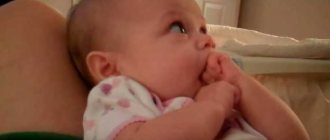Sucking reflex
The baby becomes interested in the world around him 2–3 months after birth. At the age of 4–5 months, the baby begins to understand the work of his hands and their capabilities. After this, the baby tries to understand how they work, so he sends them to his mouth for research. Then almost all objects that are within reach are used: toys, clothes, mother’s body parts.
It is important to understand that this is a normal stage in life that all children go through. The task of parents is to create a safe environment for their child. Small parts or objects with sharp edges should not come into contact with the baby. Toys that the baby plays with should always be clean.
Reduced tactile sensitivity in the mouth area
A very common problem now. Although normally a child’s tactile system should be formed by the 30th week of intrauterine life, many children have very poor sense of their body. They usually compensate for this with their vision, but in the case of the face this is difficult to do without a mirror.
A child with reduced tactile sensitivity in the mouth:
- does not notice that the face remains dirty after eating
- does not pay attention to drool and snot on his face
- if the child speaks, then the articulation is very unclear
And yes, such children often put everything into their mouths, as the brain tries to fill in the missing information that comes from the tactile receptors of the tongue, lips, and cheeks.
The behavior of a child who puts everything in his mouth indicates that he is in search of tactile stimulation. And this is not a whim, but a physiological need, similar to hunger. It's just sensory hunger.
Danger
Before we get into the issue of when babies stop putting things in their mouths, it is important to consider the consequences that may occur.
Anything that fits perfectly into a baby's mouth can get into it. It is important to understand that such a period of development is accompanied by increased danger. What does it consist of:
- Your baby may put things that are not meant to be eaten into his mouth and then swallow them. It's not so scary if it's just a piece of paper. But there is a danger that the baby may swallow a small battery, a needle, or drink dishwashing detergent.
- The child is one year old and puts everything in his mouth. During the active development of the sucking reflex, children tend to lick door handles, bus handrails and other things that are teeming with bacteria. Remember that all objects around you can be sources of viruses, which can be difficult for even an adult body to cope with.
But the danger lies not only in swallowing objects, but also in the possibility of accidentally inhaling a small part or object.
Why does a child put everything in his mouth?
The main reason is that at the age of up to 1.5 years, the child’s mouth is the main tool for learning about the world.
Maria Montessori called children of this age “sensory explorers,” since it is with the help of their senses that they actively explore the world, forming more and more neural connections in the brain. A child’s mouth has the largest number of nerve endings, which makes it possible to receive a variety of sensory sensations. When an object enters a child’s mouth, it provides information not only about its taste, but also about its surface structure, shape and temperature. For example, there are warm materials - such as wood, there are colder ones - metals, and there is plastic, which does not have any particularly bright characteristics, except for an unnatural color. Therefore, it is important that the child has access to objects made of different materials and with different textures. This will provide a variety of sensory experiences, which is essential for brain development and the formation of a broad understanding of the world.
In addition, thanks to active movements of the jaw while studying a particular subject, the child develops the muscles of the articulatory apparatus, which in turn contributes to the development of speech.
And another important benefit is strengthening the immune system. This process is aided by the antibacterial enzyme in saliva (lysozyme), which plays the role of a barrier, breaking down foreign bacteria.
Now, knowing all the benefits that a child receives from exploring the environment with the help of his mouth, it is important to build correct and comfortable behavior for yourself and your child.
We invite you to mini-courses for parents. In them, every week we share recommendations for the development and upbringing of children, and also analyze common situations. Find out details
How to stop a child from putting everything in his mouth?
Experts offer the following advice:
- Prohibit your baby from putting objects that are not food into his mouth. Don’t be lazy to remind him of this regularly if you see another attempt to put a toy in his mouth.
- Dad and grandparents should also take an active part in such prohibitions.
- Try to always play with your child. If he finds some small details, then tell him about them in detail so that he does not have the desire to explore them with the help of his tongue.
- If your baby puts the TV remote control or soap into his mouth while bathing, then show him what to do with these things.
- Do not snatch objects from your child’s hands while screaming. Try to carefully pick up the item and then explain what it is used for. Remember that even an eight-month-old baby can understand words and their meaning.
How to stop your baby from putting everything in his mouth
To ensure that children no longer put anything in their mouths, you should follow some simple rules. The most important thing is to prevent the entry of small objects that could cause harm.
Small parts can end up in the respiratory tract, get stuck and lead to a very sad outcome.
- Chewing and licking things should be prohibited regularly. All family members should do this, otherwise the baby will not understand what they want from him. After all, my dad forbids it, but my grandmother doesn’t. So it’s possible!
- In order for him to stop putting in his mouth, sucking, gnawing, licking various objects, show him what they are really needed for. During the game, tell them that “this screw held up this shelf, and this cube from the construction set should connect two walls in your house, that’s where it should be. You don’t need to put them in your mouth, you can just eat candy instead.”
- You can also divert attention from the object that he is about to taste. Ask him to help you with something, invite him to watch cartoons or read a book.
- Parents should not get angry, panic and shout at their child, or tear the object out of their hands. It’s better to calmly ask to see what he put in his mouth, and explain that he doesn’t need to do that. If the child voluntarily takes it out of his mouth or puts it in the hands of a parent, be sure to praise him. Tell him that he is great for understanding your request, and pat him on the head.
- Another question is if teething is to blame. To do this, buy a special new toy - a teether. It is also worth explaining that only she can be bitten, and the rest cannot.
Teeth cutting
When do babies stop putting everything in their mouth? Very often, babies who are just starting to cut their teeth simply try to scratch their gums. Therefore, they can drag fingers, their clothes and other objects that come to hand into their mouths. The parents' task is to provide the baby with everything necessary for this period.
Today in children's departments of stores you can find a lot of different teethers, rubber rings and other items that help the baby cope with discomfort in the mouth. If you do not feel very good about this solution to the problem, then purchase a children's pain relief gel.
Doctors' advice
Over the long period of existence of this problem, psychologists and pediatricians have formed basic recommendations for weaning people from the habit of putting objects in their mouth.
- Put away things that really should not be put into the mouth under any circumstances, so that the baby does not pick them up and carry them around.
- To ensure safety, you need to prevent small objects from getting into your baby's mouth, and those toys and things that he uses most often should be washed daily.
- Don't set a bad example. While you are biting your nails, hands, or also reflexively putting something in your mouth, children are trying to repeat after you.
- Explain to him why he can’t do this, use playful forms, praise him for correctly performed actions, use a reward system for each time he doesn’t put something in his mouth.
- React appropriately. You cannot swear, shout, or hit children. It is better to speak calmly and explain clearly.
What Doctor Komarovsky says
Dr. Komarovsky is a famous pediatrician from Ukraine who writes books and hosts programs about children’s health. Here is his commentary on the problem of “how to wean a child from putting everything in his mouth” in the program “The Dr. Komarovsky Show”: “... a person has a lot of ways to understand the world. Of all the ways to explore the world, your baby will love learning through language the most.
This is an individual feature of his body. Your job [as parents] is to ensure safety. You can even fight this. Toss objects and treat them with something bitter, viburnum berry juice. It's not harmful. We know he is bitter. They put something in, smeared it, and now he knows that it’s not always good, there will be trouble if you put it in your mouth.”
In the end, it is worth remembering that the most important thing in the topic “how to wean a child from the habit of putting everything in his mouth” is maintaining safety, as well as an adequate attitude of parents. Protect the baby from small objects to avoid accidents, keep the home clean, and do not lash out at the child or put pressure on him.
It should be weaned off with patience. It is important to understand that this will take more than one day, but following all the rules and recommendations will definitely lead to success.
Mistakes in parental actions
Children tend to imitate their parents. Therefore, before scolding your baby, analyze your actions and actions:
- Do not eat food that has fallen on the floor. Pick it up defiantly and throw it in the trash.
- Avoid using toothpicks or dental floss in front of your child. And also do not open the packaging of nuts or sweets with your teeth. If you chew a pencil or pen, then try to get rid of such a bad habit.
- Put things in their place so that the child cannot reach them.
Mistakes to Avoid
Often mothers, fathers and other relatives make mistakes that slow down the weaning process or completely negate all the results.
- Food falling on the floor. An adult can bend down, pick up fallen food from the floor and eat it. There is definitely no need to do this in front of a child. It is better to pick up this food and then throw it in the trash. It is important that he sees this action and understands that what fell on the floor should be associated with something that is already unnecessary and spoiled.
- Inedible things. There are times when an object also appears in the mouth of an adult. It could be a toothpick, or he bites off a thread, or tears a package that doesn't open well with his teeth. Bad habits such as biting nails or pens can also be noticed by a young child. Adults are a role model, so the baby will inevitably repeat your action.
- Put things in their place, clean up if the rooms are a mess. The baby will definitely put something that doesn’t fit in his mouth into his mouth.
- Don't scold or hit children. React calmly, try to explain that you can’t do this. And it’s even better if it’s all presented in a playful way.
When should you worry?
Activities for children 2–3 years old in the form of drawing or modeling often lead to the child starting to chew pencils or put plasticine in his mouth in order to taste it. Some parents consider this the absolute norm. But if your child is over 3 years old, and he continues to put various objects in his mouth, you should think about:
- When a child over three years old chews pencils, this may be his reaction to stress.
- If your child puts sand, crayons, or metal objects into his mouth, this may be a symptom of anemia.
- When do babies stop putting everything in their mouth? After 1.1–2 years. But it is important to understand that much depends on the individual characteristics of the baby. If a child continues to put everything in his mouth after three years, then the sensory functions of hearing, smell and touch should be checked. This is necessary in order to eliminate possible problems.
Unfortunately, such symptoms can occur in children with mental disorders because they are unable to control their actions.
Keep an eye on your children, contact specialists in a timely manner and be healthy!
When to start worrying
If your children are under three years old and still put things in their mouths, then this behavior is normal. But if they get older, and the habit of putting various objects in their mouth does not go away, then it is worth thinking more seriously about the first symptoms. The habit of biting nails, pens, pencils, markers, etc. may indicate stress.
There is also an opinion that the cause may be poor functioning of the organs responsible for sensitivity. He may also taste sand or chalk, which is a symptom of anemia.
These questions should be discussed with your doctor. Children with any disorder require close attention from parents and doctors. They cannot control their actions, so habits become ingrained.
What to do if the habit does not disappear with age?
The habit of putting everything in the mouth no longer seems so natural if the child is over three years old.
The overwhelming majority of children at this age no longer have the desire to try everything new and interesting. But what to do if the baby still does not get rid of such cravings? Or does he continue to put it in his mouth and suck his fingers? Many child psychologists agree that this phenomenon indicates a lack of parental warmth and attention, because it is the sucking reflex that is directly associated with the mother, her love and care. Children, satisfying this reflex, strive to fill the inner emptiness that has formed for some reason. This can be not only relationships with parents, but also stress experienced.
A consultation with a child psychologist or at least a neurologist at a clinic will help clarify things. There is definitely no need to use old folk methods to wean a child from sucking fingers, for example, smearing them with mustard or aloe juice, since this is not a solution to the problem, but getting rid of its external signs.











